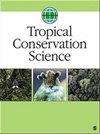墨西哥Los Tuxtlas破碎景观中景观结构对Toucan和Parrots的影响
IF 1.6
4区 环境科学与生态学
Q2 BIODIVERSITY CONSERVATION
引用次数: 0
摘要
背景和研究目的:栖息地数量在决定改良景观中鸟类物种的存在和丰度方面发挥着重要作用,而栖息地破碎化的影响很小。Toucans(Ramphastidae)和鹦鹉(Psittacidae)是体型较大的主要消费者,也是新热带森林中最具代表性的鸟类之一。它们对栖息地的丧失高度敏感;然而,他们对碎片化的反应评估不佳,导致了相互矛盾的结果。在这里,我们评估了景观结构对墨西哥Los Tuxtlas热带森林中的巨嘴鸟和鹦鹉的影响。方法:我们在洛斯图斯特拉斯的12个景观中对鸟类进行了普查,并使用多尺度景观方法来评估景观组成和配置对巨嘴鸟和鹦鹉个体数量的影响。结果:我们发现,巨嘴鸟和鹦鹉最重要、最积极的预测因子是景观中原始森林覆盖的数量。森林破碎化对巨嘴鸟个体数量有积极影响,而鹦鹉对景观中的斑块密度有消极反应,但对边缘密度有积极反应。结论:我们的研究结果表明,原始森林的丧失是洛斯图斯特拉斯巨嘴鸟和鹦鹉的主要威胁。对保护的影响:未来的保护和土地管理必须考虑保护原始森林的大小残余,避免额外的森林损失,以保护巨嘴鸟和鹦鹉及其在人类改造的新热带景观中的功能作用。本文章由计算机程序翻译,如有差异,请以英文原文为准。
Influence of Landscape Structure on Toucans and Parrots in the Fragmented Landscape of Los Tuxtlas, Mexico
Background and Research Aims: Habitat amount plays an important role in determining the presence and abundance of bird species in modified landscapes, whereas habitat fragmentation has shown little effects. Toucans (Ramphastidae) and parrots (Psittacidae) are large-bodied primary consumers and among the most representative birds in Neotropical forests. They are highly sensitive to habitat loss; nevertheless, their response to fragmentation has been poorly assessed leading to contradictory results. Here, we evaluate the influence of landscape structure on toucans and parrots in the tropical forest of Los Tuxtlas, Mexico. Methods: We censused birds in 12 landscapes of Los Tuxtlas and used a multi-scale landscape approach to assess the influence of landscape composition and configuration on the number of individuals of toucans and parrots. Results: We found that the most important and positive predictor of toucans and parrots was the amount of primary forest cover in the landscape. Forest fragmentation had positive effects on the number of toucan individuals, whereas parrots had negative responses to patch density but positive responses to edge density in the landscape. Conclusion: Our results suggest that primary forest loss is the main threat for toucans and parrots in Los Tuxtlas. Implications for conservation: Future conservation and land management must consider the protection of large and small remnants of primary forest and avoid additional forest loss in order to preserve toucan and parrots and their functional roles in human-modified Neotropical landscapes.
求助全文
通过发布文献求助,成功后即可免费获取论文全文。
去求助
来源期刊

Tropical Conservation Science
BIODIVERSITY CONSERVATION-
CiteScore
3.60
自引率
5.90%
发文量
16
审稿时长
>12 weeks
期刊介绍:
Tropical Conservation Science is a peer-reviewed, open access journal that publishes original research papers and state-of-the-art reviews of broad interest to the field of conservation of tropical forests and of other tropical ecosystems.
 求助内容:
求助内容: 应助结果提醒方式:
应助结果提醒方式:


